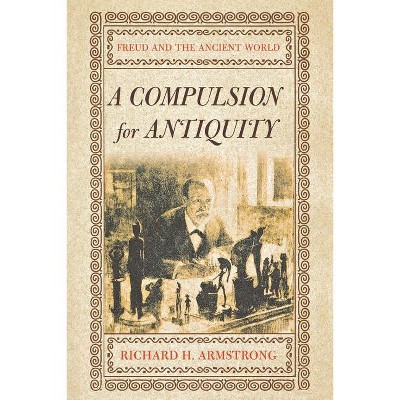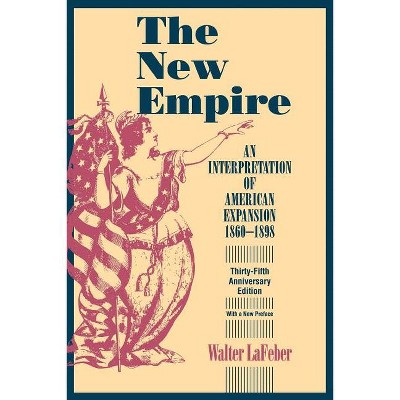Keeping America Sane - (Cornell Studies in the History of Psychiatry) by Ian Robert Dowbiggin (Paperback)

About this item
Highlights
- What would bring a physician to conclude that sterilization is appropriate treatment for the mentally ill and mentally handicapped?
- About the Author: Ian Robert Dowbiggin is Chair of the Department of History at the University of Prince Edward Island.
- 272 Pages
- Medical, History
- Series Name: Cornell Studies in the History of Psychiatry
Description
About the Book
What would bring a physician to conclude that sterilization is appropriate treatment for the mentally ill and mentally handicapped? Using archival sources, Ian Robert Dowbiggin documents the involvement of both American and Canadian psychiatrists in...
Book Synopsis
What would bring a physician to conclude that sterilization is appropriate treatment for the mentally ill and mentally handicapped? Using archival sources, Ian Robert Dowbiggin documents the involvement of both American and Canadian psychiatrists in the eugenics movement of the early twentieth century. He explains why professional men and women committed to helping those less fortunate than themselves arrived at such morally and intellectually dubious conclusions. Psychiatrists at the end of the nineteenth century felt professionally vulnerable, Dowbiggin explains, because they were under intense pressure from state and provincial governments and from other physicians to reform their specialty. Eugenic ideas, which dominated public health policy making, seemed the best vehicle for catching up with the progress of science. Among the prominent psychiatrist-eugenicists Dowbiggin considers are G. Alder Blumer, Charles Kirk Clarke, Thomas Salmon, Clare Hincks, and William Partlow. Tracing psychiatric support for eugenics throughout the interwar years, Dowbiggin pays special attention to the role of psychiatrists in the fierce debates about immigration policy. His examination of psychiatry's unfortunate flirtation with eugenics elucidates how professional groups come to think and act along common lines within specific historical contexts.
Review Quotes
A valuable and meticulously documented study.
--William H. Tucker, PhD "JAMA"Given the role that medical practitioners play in influencing public debate on health care, Ian Dowbiggin's Keeping America Sane provides a much-needed cautionary tale. Rather than arguing that North American psychiatrists mainly represented their class, Dowbiggin demonstrates the extent to which psychiatric support for eugenics was located within their own professional self-interest.... As Dowbiggin describes it, the story of eugenics in North America is one of human fallibility, of good people advocating abuses of basic human rights for the very best reasons.... Keeping America Sane is a much needed addition to Canadian and American medical history.
-- "The Canadian Historical Review"It would be accurate to state that a majority of late-19th- and early-20th-century scientists, particularly social scientists, were favorably inclined toward eugenics.... Pressure from government bureaucrats, public alarm over the mental health of new immigrants, and the dispiriting experience of practicing within the state mental hospital led individual psychiatrists to sanction the eugenics movement.... Dowbiggin ably tells this story.
-- "Choice"Keeping America Sane is a valuable addition to the still small number of first-rate studies we possess of any aspect of the history of twentieth-century psychiatry.... This is a well-researched and original monograph that deserves a warm welcome.... It sets a high standard for the new series of Cornell Studies in the History of Psychiatry.
-- "Medical History"No other author... has produced such a close and empathetic analysis of the profession's inhouse squabbles.... Ian Dowbiggin has produced a useful portrait of North American psychiatry and its relations with eugenics.
-- "The International History Review"Too often the treatments of eugenics are incomplete, simplistic, and misinformed. One would hope that those authors will read Ian Dowbiggin's history of eugenics in the United States and Canada so that they might correct or enrich their own accounts. In this archive-based history, Dowbiggin, a historian of psychiatry, focuses on the roles that psychiatry played in the eugenics movement. The author seeks to understand why psychiatrists endorsed eugenics, what eugenics programs they advocated, why they lost faith in eugenics and what role they played in the eventual passage of eugenics laws. These and other questions are answered in this very readable account.... This book offers readers two histories woven into one story: the eugenics movement in North America and the 20th century transformation of psychiatry.... A well-researched account. The history of eugenics is redefined in this outstanding book that draws on a rich analysis of behavior, medicine, politics, and culture.
--Ludy T. Benjamin Jr. "American Scientist"About the Author
Ian Robert Dowbiggin is Chair of the Department of History at the University of Prince Edward Island. He is the author of Inheriting Madness: Professionalization and Psychiatric Knowledge in Nineteenth-Century France; A Merciful End: The Euthanasia Movement in Modern America, and A Concise History of Euthanasia: Life, Death, God, and Medicine.











